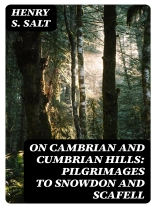In ‘On Cambrian and Cumbrian Hills: Pilgrimages to Snowdon and Scafell, ‘ Henry S. Salt masterfully intertwines the themes of nature, spirituality, and personal reflection. Written in a vivid and poetic prose, Salt captures the sublime beauty of the Welsh and Cumbrian landscapes while simultaneously exploring the intellectual and emotional responses these environments provoke. This work serves not only as a travelogue but also as a philosophical inquiry into the human relationship with nature, placing it within the broader context of the Romantic movement where the natural world is central to understanding one’s existence. Henry S. Salt (1851-1939) was an English writer, philosopher, and early advocate for animal rights, whose diverse interests significantly influenced his literary voice. His background in classical studies and his experiences as a schoolmaster imbued him with a deep appreciation for nature, which resonates throughout this book. Salt’s commitment to social reform and his humanistic ideals find expression in the meditative quality of his writing, reflecting both his personal convictions and his broader ethical concerns. Readers seeking a profound exploration of the majesty of nature and its implications for the human spirit will find ‘On Cambrian and Cumbrian Hills’ an enriching and enlightening read. Salt’s eloquent prose invites contemplation and empathy, making this pilgrimage through the hills a timeless journey worth undertaking.
About the author
Henry Stephens Salt (1851–1939) was an English writer, social reformer, and pioneering advocate for animal rights. His work extended into various domains, including literature, politics, and philosophy, always underlined by his strong ethical drive. Salt was educated at Eton College and King’s College, Cambridge, and later became a master at Eton before turning to a life of advocacy and writing. His literary style was characterized by its clarity, simplicity, and moral earnestness, which was particularly evident in his biographical and critical works on poets and humanitarians, reflective of his own values and ideals. Among his numerous books, ‘On Cambrian and Cumbrian Hills: Pilgrimages to Snowdon and Scafell’ (1922) showcased his love for the natural world and campaigned for the appreciation and preservation of the British countryside. As a humane educator, Salt’s writing often invoked the beauty of nature, correlating its preservation with the larger context of social and moral reform, a theme he explored through various other writings. Salt’s influence extended beyond literature; he was a founding member of the Humanitarian League and an ardent advocate for social reforms, including vegetarianism, anti-vivisection, and animal rights, which he powerfully argued for in books like ‘Animals’ Rights: Considered in Relation to Social Progress’ (1892). His contributions to humanitarian and ethical discourse remain a significant part of his legacy.












